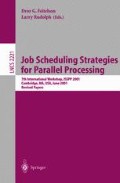Abstract
Effective scheduling strategies to improve response times, throughput, and utilization are an important consideration in large supercomputing environments. Such machines have traditionally used space-sharing strategies to accommodate multiple jobs at the same time. This approach, however, can result in low system utilization and large job wait times. This paper discusses three techniques that can be used beyond simple space-sharing to greatly improve the performance figures of large parallel systems. The first technique we analyze is backfilling, the second is gang-scheduling, and the third is migration. The main contribution of this paper is an evaluation of the benefits from combining the above techniques. We demonstrate that, under certain conditions, a strategy that combines backfilling, gang-scheduling, and migration is always better than the individual strategies for all quality of service parameters that we consider.
Access this chapter
Tax calculation will be finalised at checkout
Purchases are for personal use only
Preview
Unable to display preview. Download preview PDF.
References
A. B. Downey. Using Queue Time Predictions for Processor Allocation. In IPPS’97 Workshop on Job Scheduling Strategies for Parallel Processing, volume 1291 of Lecture Notes in Computer Science, pages 35–57. Springer-Verlag, April 1997.
D. G. Feitelson. ASurvey of Scheduling in Multiprogrammed Parallel Systems. Technical Report RC 19790 (87657), IBM T. J. Watson Research Center, October 1994.
D. G. Feitelson. Packing schemes for gang scheduling. In Job Scheduling Strategies for Parallel Processing, IPPS’96Workshop, volume 1162 of Lecture Notes in Computer Science, pages 89–110, Berlin, March 1996. Springer-Verlag.
D. G. Feitelson and M. A. Jette. Improved Utilization and Responsiveness with Gang Scheduling. In IPPS’97 Workshop on Job Scheduling Strategies for Parallel Processing, volume 1291 of Lecture Notes in Computer Science, pages 238–261. Springer-Verlag, April 1997.
D. G. Feitelson, L. Rudolph, U. Schwiegelshohn, K. C. Sevcik, and P. Wong. Theory and Practice in Parallel Job Scheduling. In IPPS’97 Workshop on Job Scheduling Strategies for Parallel Processing, volume 1291 of Lecture Notes in Computer Science, pages 1–34. Springer-Verlag, April 1997.
D. G. Feitelson and A. Mu’alem Weil. Utilization and predictability in scheduling the IBM SP2 with backfilling. In 12th International Parallel Processing Symposium, pages 542–546, April 1998.
H. Franke, J. Jann, J. E. Moreira, and P. Pattnaik. An Evaluation of Parallel Job Scheduling for ASCI Blue-Pacific. In Proceedings of SC99, Portland, OR, November 1999. IBM Research Report RC21559.
H. Franke, P. Pattnaik, and L. Rudolph. Gang Scheduling for Highly Effficient Multiprocessors. In Sixth Symposium on the Frontiers of Massively Parallel Computation, Annapolis, Maryland, 1996.
R. Gibbons. A Historical Application Profiler for Use by Parallel Schedulers. In IPPS’97 Workshop on Job Scheduling Strategies for Parallel Processing, volume 1291 of Lecture Notes in Computer Science, pages 58–77. Springer-Verlag, April 1997.
B. Gorda and R. Wolski. Time Sharing Massively Parallel Machines. In International Conference on Parallel Processing, volume II, pages 214–217, August 1995.
N. Islam, A. L. Prodromidis, M. S. Squillante, L. L. Fong, and A. S. Gopal. Extensible Resource Management for Cluster Computing. In Proceedings of the 17th International Conference on Distributed Computing Systems, pages 561–568, 1997.
J. Jann, P. Pattnaik, H. Franke, F. Wang, J. Skovira, and J. Riordan. Modeling of Workload in MPPs. In Proceedings of the 3rd Annual Workshop on Job Scheduling Strategies for Parallel Processing, pages 95–116, April 1997. In Conjuction with IPPS’97, Geneva, Switzerland.
H. D. Karatza. A Simulation-Based Performance Analysis of Gang Scheduling in a Distributed System. In Proceedings 32nd Annual Simulation Symposium, pages 26–33, San Diego, CA, April 11-15 1999.
D. Lifka. The ANL/IBM SP scheduling system. In IPPS’95 Workshop on Job Scheduling Strategies for Parallel Processing, volume 949 of Lecture Notes in Computer Science, pages 295–303. Springer-Verlag, April 1995.
J. E. Moreira, W. Chan, L. L. Fong, H. Franke, and M. A. Jette. An Infrastructure for Efficient Parallel Job Execution in Terascale Computing Environments. In Proceedings of SC98, Orlando, FL, November 1998.
J. K. Ousterhout. Scheduling Techniques for Concurrent Systems. In Third International Conference on Distributed Computing Systems, pages 22–30, 1982.
U. Schwiegelshohn and R. Yahyapour. Improving First-Come-First-Serve Job Scheduling by Gang Scheduling. In IPPS’98 Workshop on Job Scheduling Strategies for Parallel Processing, March 1998.
J. Skovira, W. Chan, H. Zhou, and D. Lifka. The EASY-LoadLeveler API project. In IPPS’96 Workshop on Job Scheduling Strategies for Parallel Processing, volume 1162 of Lecture Notes in Computer Science, pages 41–47. Springer-Verlag, April 1996.
W. Smith, V. Taylor, and I. Foster. Using Run-Time Predictions to Estimate Queue Wait Times and Improve Scheduler Performance. In Proceedings of the 5th Annual Workshop on Job Scheduling Strategies for Parallel Processing, April 1999. In conjunction with IPPS/SPDP’99, Condado Plaza Hotel & Casino, San Juan, Puerto Rico.
K. Suzaki and D. Walsh. Implementation of the Combination of Time Sharing and Space Sharing on AP/Linux. In IPPS’98 Workshop on Job Scheduling Strategies for Parallel Processing, March 1998.
K. K. Yue and D. J. Lilja. Comparing Processor Allocation Strategies in Multiprogrammed Shared-Memory Multiprocessors. Journal of Parallel and Distributed Computing, 49(2):245–258, March 1998.
B. B. Zhou, R. P. Brent, C. W. Jonhson, and D. Walsh. Job Re-packing for Enhancing the Performance of Gang Scheduling. In Job Scheduling Strategies for Parallel Processing, IPPS’99 Workshop, pages 129–143, April 1999. LNCS 1659.
Author information
Authors and Affiliations
Editor information
Editors and Affiliations
Rights and permissions
Copyright information
© 2001 Springer-Verlag Berlin Heidelberg
About this paper
Cite this paper
Zhang, Y., Franke, H., Moreira, J.E., Sivasubramaniam, A. (2001). An Integrated Approach to Parallel Scheduling Using Gang-Scheduling, Backfilling, and Migration. In: Feitelson, D.G., Rudolph, L. (eds) Job Scheduling Strategies for Parallel Processing. JSSPP 2001. Lecture Notes in Computer Science, vol 2221. Springer, Berlin, Heidelberg. https://doi.org/10.1007/3-540-45540-X_9
Download citation
DOI: https://doi.org/10.1007/3-540-45540-X_9
Published:
Publisher Name: Springer, Berlin, Heidelberg
Print ISBN: 978-3-540-42817-6
Online ISBN: 978-3-540-45540-0
eBook Packages: Springer Book Archive

